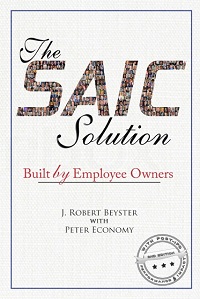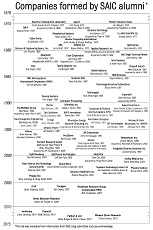Technical Worker Shortage and Nuclear Energy
7 Comments Published by Dr. Beyster February 15th, 2011 in Competitiveness, Energy, San Diego, Technology.In my last blog post, I discussed the fact that American young people scored significantly lower in the areas of math, science, and reading than their foreign counterparts on the 2009 PISA test. In my opinion, this shortfall in achievement will eventually lead to a shortage of qualified workers for high-technology companies in this country.
I was interested to read an article in last week’s San Diego Union-Tribune stating that the shortage in qualified technology professionals is already here, at least in San Diego. According to the article, a recent survey conducted by the San Diego Software Industry Council found that there are currently about 6,000 information-technology job openings in San Diego County. In addition, according to Connect, there are about 2,000 current job openings in mechanical and electrical engineering.
Where are the thousands of San Diegans needed to fill these jobs? And if they are not available now, how will we ensure they are available to fill these jobs in the future?
My concern is twofold. San Diego high-tech companies are not working at their capacity because they don’t have the people they need to do the work that needs to be done. If this situation goes on for a prolonged period of time, the companies will either find qualified employees elsewhere, or they will simply leave San Diego. This will have a long-lasting negative impact on our economy, and on the region’s future.
In other news, I was pleased to see that the Obama administration’s 2012 budget proposal includes $853 million for nuclear energy, including the development of small modular reactors that will be significantly less expensive to manufacture and much easier to deploy than conventional reactors. I am a fan of significantly increasing our use of nuclear energy to break our dependence on foreign sources of fuel, while reducing the production of greenhouse gases.
In addition, Obama proposed $2 billion for the Department of Energy to support basic energy sciences in hopes of discovering new ways to produce, store, and use energy. Increasingly, the private sector is moving away from basic research, instead focusing on the kinds of development that lead to more-immediate financial returns. As a percentage of gross domestic product, federal funding of research and development has also declined. The amount of federal funds devoted to R&D as a percentage of gross domestic product is only 60% what it was in the 1960s.
While Obama’s proposed amounts for basic and nuclear energy research at the Department of Energy will be a tough sell in this difficult budget year, I am convinced it is an investment that will pay long-term dividends for our country. One day we will run out of fossil fuels, so we must be prepared for that day when it comes.
Thank you for keeping in touch. I enjoy reading your messages. Don’t hesitate to write to me on any subject. I am more than happy to respond.
– Bob





There is no shortage of qualified technology professionals. This is simply a marketing gimmick that companies use to increase billing rates.
There is however a shortage of quality companies to work for.
All too often companies require employees to provide their own equipment to do the job, or change benefits packages as the employee moves from one contract to another one, or are required to fund their own business travel, or some other HR driven Machiavellian strategy.
Show me a company that does not practice any of those, and I will show you a company that has a line of people at the front door every morning, and has no vacancies.
Damian: I don’t agree with your statement that there is no shortage of qualified technology professionals. I don’t know what the situation is on a national level, but in San Diego my understanding is that there are 6,000 current information technology vacancies that remain unfilled, despite attempts to recruit qualified candidates. You are, of course, correct that some of these companies are better than others, but even some of the best-quality companies here in San Diego seem to be facing this challenge. — Bob
Again, show me a company that doesn’t:
Require employees to provide their own hardware/software,
Play benefits roulette,
Post inflated salary rates to job boards in order to acquire resumes
Lowball employee salary through the HR guise of “top grading”
Show me that, and I’ll show you a company that has people lined up every morning wanting to be a part of it.
Name one company so some quick analysis can be done of the business practices. Washington DC area would be nice.
My observations are more in line with Dr. Beyster’s. Companies (at least high-tech, which is what I see most) are definitely wanting to hire. At UCSD, we are constantly being asked by local companies (from big like Qualcomm and SAIC to small start-ups) and others (Amazon, Google, HP, Microsoft) to encourage our students to apply to them. And I know they do hire, as I mentioned the above companies by name because I know of specific and recent cases for each one. Having said this, while companies do want to grow, they also want good people, as a new employee is a big commitment, and especially given current economic times, every hire is a substantial risk.
And some of the companies you mention are representative of what I’ve written about above.
I believe you are “spot on” with your opinion on nuclear power and the need to research energy solutions. Nuclear is the only energy source available to sustain our insatiable energy appetite without destroying our planet or economies. And the only way we can change this is through fundamental research. This is not going to happen in the normal business of the private sector for the reasons you noted. The money we spend to “subsidize” energy alternatives brings little advancement to the technologies. A lot of the projects subsidized are actually energy negative and detrimental to our cause. Subsidies make it profitable, but it doesn’t change the first law of thermodynamics. Corn ethanol is case and point. Most of the solar systems currently being installed are on the same track. We have to be a little less idealistic and a little more rational in our policy making.
Darin: Thank you for your post on my blog. I agree with you on the importance of fundamental research. We risk falling behind the rest of the world if we give it short shrift. — Bob